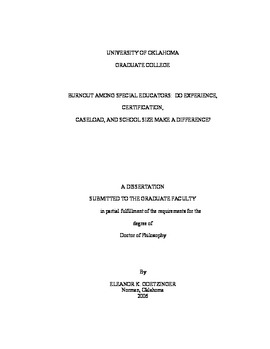| dc.description.abstract | The purpose of this study was to address various concerns regarding the burnout rate of special educators in Oklahoma school settings. The provision of a free and appropriate public education (FAPE) to students with disabilities is dependent upon the retention of qualified special education teachers in the classroom. Although attrition of special education teachers can be attributed to many factors, there has been a specific concern about the role of professional burnout. The following factors are discussed: (a) definition of stress, (b) definition of burnout, (c) experience of special education teachers in the field, (d) caseload, (e) certification status among special educators, and (f) school size. Among 226 current full time special education teachers with a minimum of three years teaching experience in Oklahoma, the relationships of experience, types of certification, amount of current number of students per caseload, and school size to three dimensions of burnout-emotional exhaustion, depersonalization, and personal accomplishment were examined. Data were collected through a survey that utilized the use of the Maslach Burnout Inventory (Maslach, Jackson, & Leiter, 1996) and a 56-question survey pertaining to the teacher's amount of experience, demographics, types of certification, and teacher's caseload. Following a regression analysis, findings indicated that amount of teaching experience, types of teachers' certification and school size were non significant. The number of students on a teacher's caseload was statistically significant to degrees of burnout in the area of emotional exhaustion. Implications of these findings for school support programs, specific resources in the working environment, and supply of special education teachers are suggested. | en_US |
